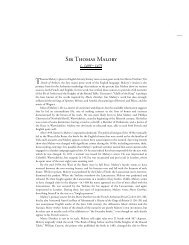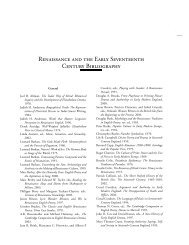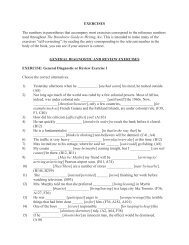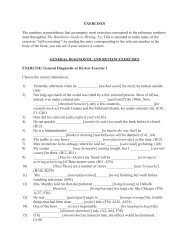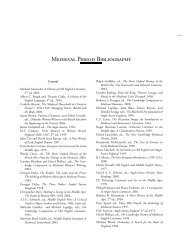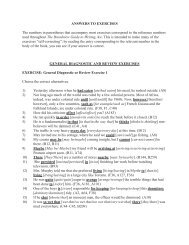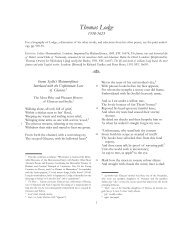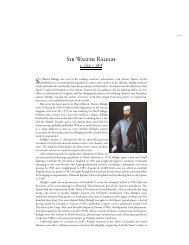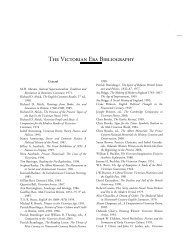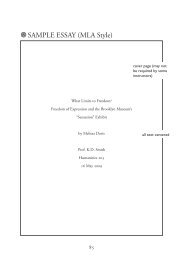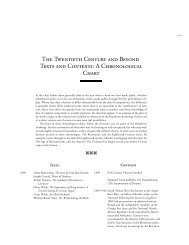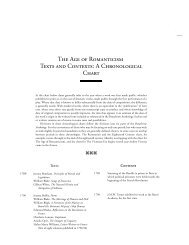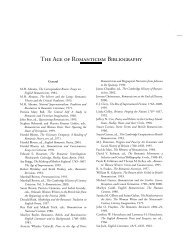Contexts: The Abolition of Slavery - Broadview Press Publisher's Blog
Contexts: The Abolition of Slavery - Broadview Press Publisher's Blog
Contexts: The Abolition of Slavery - Broadview Press Publisher's Blog
Create successful ePaper yourself
Turn your PDF publications into a flip-book with our unique Google optimized e-Paper software.
from Samuel Taylor Coleridge, On the Slave Trade<br />
(1796)<br />
<strong>The</strong> article from which this excerpt is taken was<br />
delivered as a lecture in 1795, and published in<br />
Coleridge’s magazine <strong>The</strong> Watchman the following<br />
year.<br />
Ihave dwelt anxiously on this subject, with a particular<br />
view, to the Slave-trade, which, I knew, has insinuated<br />
in the minds <strong>of</strong> many, uneasy doubts respecting the<br />
existence <strong>of</strong> a beneficent Deity. And indeed the evils<br />
arising from the formation <strong>of</strong> imaginary Wants, have in<br />
no instance been so dreadfully exemplified, as in this<br />
inhuman Traffic. We receive from the West-India<br />
Islands Sugars, Rum, Cotton, Logwood, Cocoa, C<strong>of</strong>fee,<br />
Pimento, Ginger, Indigo, Mahogany, and Conserves.<br />
Not one <strong>of</strong> these articles are necessary; indeed with the<br />
exception <strong>of</strong> Cotton and Mahogany we cannot truly call<br />
them even useful: and not one <strong>of</strong> them is at present<br />
attainable by the poor and labouring part <strong>of</strong> Society. In<br />
return we export vast quantities <strong>of</strong> necessary Tools,<br />
Raiment, and defensive Weapons, with great stores <strong>of</strong><br />
Provision. So that in this Trade as in most others the<br />
Poor are employed with unceasing toil first to raise, and<br />
then to send away the Comforts, which they themselves<br />
absolutely want, in order to procure idle superfluities for<br />
their Masters. If this Trade had never existed, no one<br />
human being would have been less comfortably<br />
cloathed, housed, or nourished. Such is its value—they<br />
who would estimate the price which we pay for it, may<br />
consult the evidence delivered before the House <strong>of</strong><br />
Commons.<br />
from William Earle, Obi; or, the History <strong>of</strong> Three-<br />
Fingered Jack (1800)<br />
Earle’s novel is set against the background <strong>of</strong> a slave<br />
rebellion in Jamaica; it is based on the true story <strong>of</strong><br />
Jack Mansong, an escaped slave who was said to<br />
have gained strength to lead the rebellion from the<br />
religion <strong>of</strong> “obeah,” or “obi.” <strong>The</strong> epistolary novel is<br />
for the most part made up <strong>of</strong> letters from one<br />
George Stanford, “a resident <strong>of</strong> Jamaica,” to<br />
Charles, “his friend in England.” <strong>The</strong> excerpt that<br />
<strong>The</strong> <strong>Abolition</strong> <strong>of</strong> <strong>Slavery</strong> 13<br />
appears here is from the letter with which the book<br />
opens.<br />
J ack is a noble fellow, and in spite <strong>of</strong> every cruel hardhearted<br />
planter, I shall repeat the same to the last<br />
hour <strong>of</strong> my life. “Jack is a Negro,” say they. “Jack is a<br />
MAN,” say I.<br />
—“He is a slave.”<br />
—“MAN cannot be a slave to MAN.”<br />
—“He is my property.”<br />
—“How did you acquire that property?”<br />
—“By paying for it.”<br />
—“Paying! Paying whom?”<br />
—“Him who brought him from Africa.”<br />
—“How did he get possession <strong>of</strong> him?”<br />
—“He caught him there.”<br />
—“Caught! what? Like a wild beast?”<br />
—“No, but he contrived means to convey him into<br />
his ship?”<br />
—“Contrived! <strong>The</strong>n he brought him without his<br />
consent?”<br />
—“Very likely.”<br />
—“And what is become <strong>of</strong> that robber?”<br />
—“Robber! He is a very respectable man, who has<br />
left <strong>of</strong>f trade, has married the daughter <strong>of</strong> a rich planter,<br />
and now lives very comfortably, after the fatigues <strong>of</strong> an<br />
industrious life.”<br />
—“What! Do they hang a poor hard-labouring man,<br />
who, driven by despair at the sight <strong>of</strong> his numerous<br />
family ready to starve for want <strong>of</strong> a bit <strong>of</strong> bread, takes<br />
advantage <strong>of</strong> a dark night, goes on the highway and<br />
frightens the traveller out <strong>of</strong> a few pieces <strong>of</strong> gold, and<br />
shall a daring ruffian, who is openly guilty <strong>of</strong> a crime<br />
more heinous in its nature and baneful in its effects, get<br />
respected by every body and pass his days in the peaceable<br />
enjoyment <strong>of</strong> riches acquired by such infamous<br />
means?”<br />
—“I don’t understand you; I never heard that the<br />
traffic was infamous. Is it not authorised by all the<br />
nations <strong>of</strong> Europe, Asia and America? Have not regulations<br />
been made concerning it by all governments?”<br />
—“Very true, but that does not make it more<br />
honorable.”<br />
—1800



